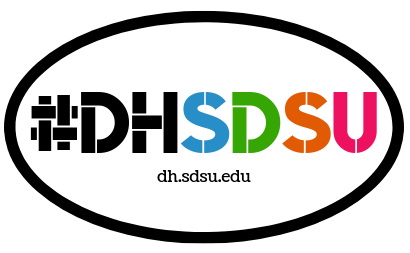Scalar is a free, open source authoring and publishing platform that’s designed (at USC) to make it easy for authors to write long-form, born-digital scholarship online. Great for creating complex, multi-modal essays. Learn more about Scalar here.
Tutorials
- New in Fall 2022: The Digital Humanities Center created 10 tutorials for using Scalar, all available on our DH@SDSU YouTube channel and Tool Tutorials playlist. We’ve also got a slideshow about incorporating Google maps into Scalar. These tutorials were created by Andrea Berreondo, Alexandria (“Allie”) Henderson, and Mik Knight under the direction of Romain Delaville.
- Slide-deck of introductory workshop led by Cassie Tanks (DHC assistant) in Spring 2020. Great for sharing with students as step-by-step guide. (Google slides version is available here.)
Examples:
Scalar was created at USC to support the pioneering online scholarly journal Vectors, which published multimodal essays from 2005-2013, so the best sample projects can be seen in the journal’s archive. For example see “Surfacing” by Nicole Starosielski, Erik Loyer, and Shane Brennan (2015)
A companion to Nicole Starosielski’s book The Undersea Network, and powered by Scalar, Surfacing makes the underwater rhizome connections we depend on for our everyday data needs navigable by geography and theme. The work subverts typical mapping interfaces by placing the user in a continuous chain of views which can be zoomed in and out to reveal new dimensions in the content.
SDSU Scalar projects:
Student Project: Bree Hawkins (MA student in English) used Scalar to create a critical essay about the digital novel Pry (Tender Claws, 2015). “Stream of Consciousness Revisited” uses text, image, video, links, annotations, and more to present an argument about how consciousness is represented in digital media. The project was created for Professor Jessica Pressman’s ENG 560 “Digital Literature” (Spring 2020) class.
Course Assignment: Final Digital Project 25% for ENG 560 “Digital Literature”: The course culminates in a final essay which is presented as an electronic text–a website whose interface, aesthetic, and navigational elements support the intellectual claims of the argument. To repeat, as this is the main point of the assignment (for all 3 options listed below) and the grading of it: the form and format of the essay must support the argument (content). This final essay will push you to implement your learned critical methodology of medium-specific analysis in a creative-critical way.
*You must meet with the professor, in person or virtually, to receive full credit on this project.
Options for Final Project:
1) A thesis-driven close reading at least two creative works of digital literature (at least one from our syllabus, and not examined in your midterm) that uses at least 2 critical sources. (6-8 pages, 2000+ words)
2) A creative work of digital literature accompanied by a short (5 pg.) critical analysis of your composition. You must use at least 2 critical sources to situate and explain your work.
3) A curated exhibition of electronic literature that includes an analytical introduction and rationale (5 pgs.) in the form of an overview or viewing guide for the collection you create. You must use at least 2 critical sources to situate your exhibition.
See class syllabus here.
Scalar-based Course & Portfolio of Student Projects
Professor Clarissa Clò (Director of Italian Studies Program, Department of European Studies) has used Scalar for class projects and the final presentation of them. Here are some examples of how she build an entire class around, and through, Scalar:
- This Scalar “book” was developed for the course “Italian American Culture” in which students studied selected Italian American cultural texts and representations, from novels to films, music, and criticism – roughly spanning the historical arc of the 20th century.
- This Scalar book was developed for the course “Italian Migrations in Literature, Film and Popular Culture.” This course adopts an interdisciplinary, comparative, and transnational approach to the study of the making of Italians through the experience of migration. It uses literature, film, music, and popular culture, and focuses on the cultural history of Italians in Italy and abroad from Italian Unification (1861) to the present.
- This Scalar book was developed for the course ITAL 510: Italian Migration”. In this course, completely taught in Italian, we explored Italy’s rich emigrant past in relation to today’s immigration flows toward the peninsula. In their final projects students worked on digital creative and autoethnographic essays drawing from their own personal histories of migration.
Faculty point of contact:
- Clarissa Clò (Director of Italian Studies Program, Department of European Studies) can help explain how she used Scalar to redesign her classes. cclo@sdsu.edu.
- Jessica Pressman (English and Comparative Literature) can help you design assignments using Scalar and provide examples of student projects created in Scalar as well as born-digital literature made in Scalar. jpressman@sdsu.edu
- Pam Lach (DH Librarian) can support use of Scalar. plach@sdsu.edu
